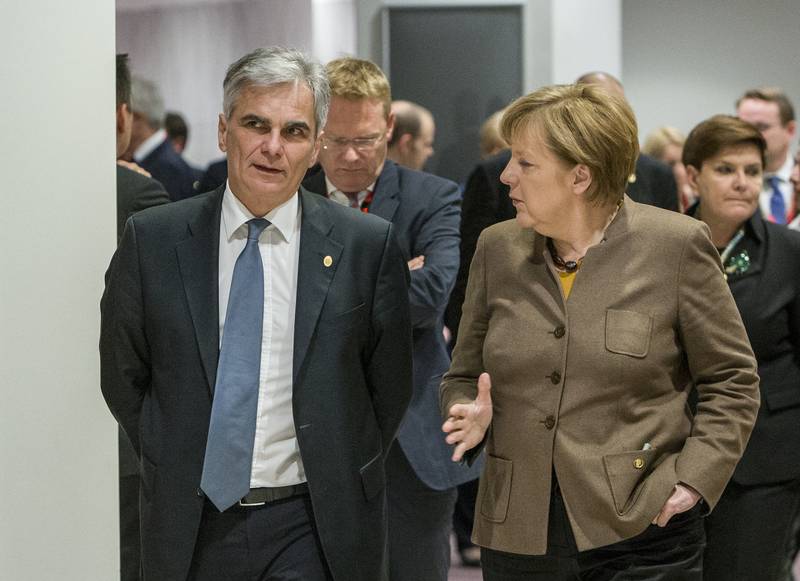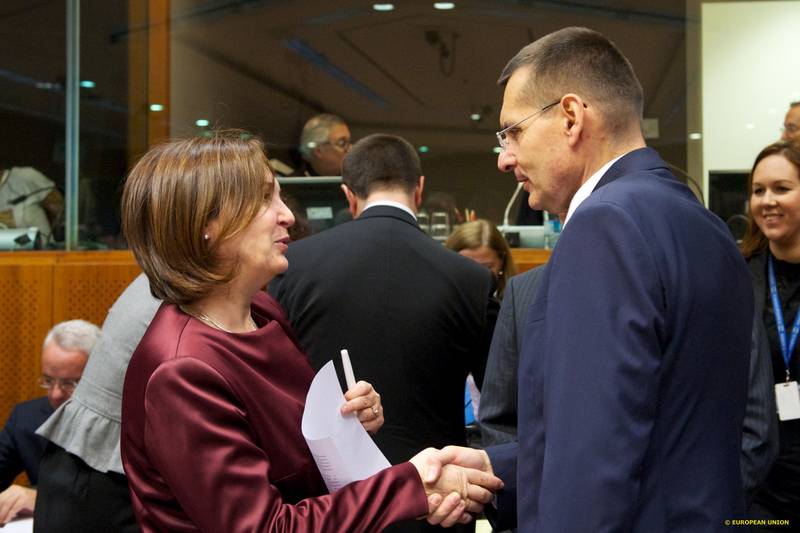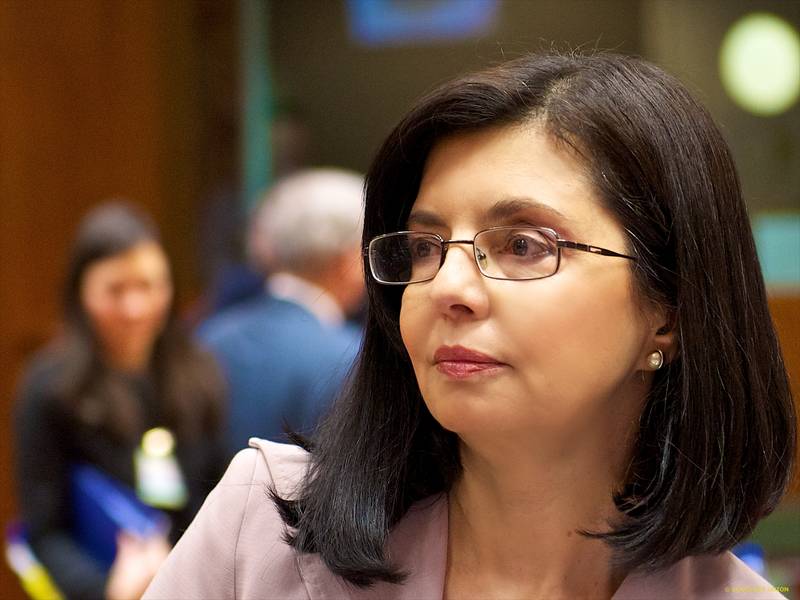The spirit of Schengen has not been respected by Europe
Irena Mihaylova, August 8, 2011
 Italy and France have been officially cleared by the European Commission last week, for their much controversial unilateral reaction aimed at solving the problem with the North-African immigrant flow. In April this year Italy has issued the North-Africans temporally residence permits for the Schengen zone, in response to that France quickly managed to close its Italian border to keep its territory free of the refugees. The French-Italian affair has been called by Guy Verhofstadt (leader of the Group of the Alliance of Liberals and Democrats for Europe in the European Parliament) a ping-pong game of passing the responsibility for the thousands of Tunisians looking for a shelter.
Italy and France have been officially cleared by the European Commission last week, for their much controversial unilateral reaction aimed at solving the problem with the North-African immigrant flow. In April this year Italy has issued the North-Africans temporally residence permits for the Schengen zone, in response to that France quickly managed to close its Italian border to keep its territory free of the refugees. The French-Italian affair has been called by Guy Verhofstadt (leader of the Group of the Alliance of Liberals and Democrats for Europe in the European Parliament) a ping-pong game of passing the responsibility for the thousands of Tunisians looking for a shelter.
“From a formal point of view steps taken by Italian and French authorities have been in compliance with EU law. However, I regret that the spirit of the Schengen rules has not been fully respected”, stated Cecilia Malmström, the European Commissioner of Internal Affairs in a special announcement on the 25 July 2011. In her critical statement Malmström has declared that “Schengen and free movement is one of the most tangible, popular and successful achievements of the European project” and promised that she would do her utmost to safeguard those achievements and develop them in terms of the Schengen acquis.
For the purpose the Commission's statement recommends a tough mechanism for monitoring and assessment of Schengen rules and practising the community method, which allows the Commission to lead in initiating reforms aimed at improving Schengen. The idea of such a mechanism was enshrined in the conclusions of the leaders of the member states at their June European Council. The Commission’s analysis, quoted by Malmström, reasserts that the permits issued by Italy, which grant the asylum seekers the right to reside and move freely on Schengen territory, have been in compliance with the legal procedure. On the other side the checks of border police, carried out by French authorities, and the subsequent expulsion of a couple of hundred immigrants, among who were representatives from non-governmental humanitarian organisations, back to Italy have also been in conformity with the Schengen Border Code (SBC) – the law of the European free zone.
The strong conflict that occurred between the two neighbouring countries has logically revealed the deficits of the Schengen system, not only in their legal, but in their ethical aspects as well, questioning thus the idea of European solidarity and mutual trust among the members of Schengen. The April scandal between Italy and France has broadly affected Europe, as Germany, Belgium and Austria have warned to re-introduce border controls and accused Italy of politicising the problem with the Tunisian immigrants and therefore threatening the Schengen system with collapse. In May, Denmark has unilaterally announced it would re-establish border controls. Without giving too much explanation on the subject, the Northern partner of Schengen has opened another wound in the already exhausted from political and economic crises spirit of Europe.
The events have been termed by the Centre for European Policy Studies (CEPS) a “race against solidarity” where the European principles of solidarity, cooperation and human rights, have been abandoned by the members of the European Union. At the expense of the latter ‘principles’, at times of crisis, the flow of unwanted immigrants has been perceived as a direct threat to the national ratings of political leaders, who choose to play it safe prior elections, betraying in a sense the Schengen agreement and the European Charter of Human Rights.
The motives behind such controversial actions are easy to see – much of the states mostly affected by the flow of refugees are in the southern periphery of the EU, which is today mostly affected by debt crisis, budget cuts, expensive loans, economic slowdown and huge unemployment.
From the Arab Spring, that reached Europe’s shores at lightening speed, to Malmström’s message for the “disrespected” spirit of Schengen, Europe has turned into an arena for many controversial debates, as euinside has thoroughly informed. Nicolas Sarkozy, president of France, and Silvio Berlusconi, Italy's prime minister, have been the first to start a campaign for changing the rules of Schengen and returning the borders during a crisis situation. Answering to their pledge, the President of the Commission, José Manuel Barroso, has engaged on behalf of the Commission to propose reforms in September. On the other side, the European Parliament has been much vocal since May, in expressing its strong discontent against corrupting the Schengen idea with populist concerns.
Barroso himself has declared in front of before Parliament that re-establishing the borders is an unwanted development for Europe and would be taken only as a very last resort. The critiques from the European Parliament and the Commission have not managed to stop the unilateral decisions of countries to re-establish border controls, which has been formulated by the June European Council as a “safeguard clause” that could be introduced when the Schengen area is at risk.
The expectations of the European Parliament, non-governmental organisations for human rights and self-confessed Euro-optimists for the Commission and member states to save the spirit of Schengen, would be huge. The concerned Commissioners would be challenged to resolve the divisive questions of a common asylum and immigration policy to sort out the regulations regarding the Schengen permits and propose better rules for evaluation, monitoring and coordination of the system.
In September the question of the Bulgarian and Romanian membership case will be discussed again. The two countries have been approved as technically ready to join the common area of security, but some of the Schengen states are still questioning the ability of both future members to exercise effective border control due to the lack of sufficient progress in tackling corruption. It has been expected that the yearly report of the European Commission on the mechanism regarding the improvement of both countries justice and interior affairs structures would ease EU’s decision. However, the word Schengen is not mentioned not even once in the document, but the assessment of both countries, especially of Bulgaria's efforts to fight corruption and organised crime, is too critical.
It is expected the new proposals for reforms to get stuck in the "Bermuda Triangle" among the institutions with the already extended role of the European Parliament, to which the Lisbon Treaty assigned the role of a co-legislator, as it happened with the economic governance which still is blocked in the negotiations procedure between the Council (the member states) and the Parliament. And EU's ambition was the Six Pack to be voted before the summer break. It is this sort of “Schengen Triangle” between the Council of Ministers, the Commission and the Parliament, where European solidarity and trust often fall victims of nationalistic streams, populist storms and financial vortexes, and where the decisions for the European free zone and the spirit of Schengen will be taken.
 Werner Faymann, Angela Merkel | © Council of the EU
Werner Faymann, Angela Merkel | © Council of the EU Rumyana Bachvarova, Petre Toba | © Council of the EU
Rumyana Bachvarova, Petre Toba | © Council of the EU Meglena Kuneva | © Council of the EU
Meglena Kuneva | © Council of the EU | © European Parliament
| © European Parliament | © The Council of the European Union
| © The Council of the European Union | © European Parliament
| © European Parliament